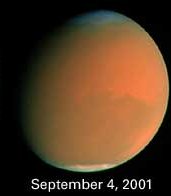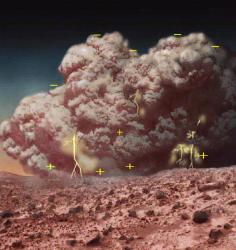Yeah.
Testing blockquotes.
I love space.
Space loves me.
So does the rest of
Humanity.
End test.
Yeah.
Testing blockquotes.
I love space.
Space loves me.
So does the rest of
Humanity.
Their seems to have been much discussion around the blogosphere regarding the definition of a planet. Currently there are nine, but all of that may change with the International Astronomical Union considering to add three more worlds to the list.
(Universe Today) The world's astronomers, under the auspices of the International Astronomical Union (IAU), have concluded two years of work defining the difference between "planets" and the smaller "solar system bodies" such as comets and asteroids.
If the definition is approved by the astronomers gathered 14-25 August 2006 at the IAU General Assembly in Prague, our Solar System will include 12 planets, with more to come: eight classical planets that dominate the system, three planets in a new and growing category of "plutons"--Pluto-like objects--and Ceres. Pluto remains a planet and is the prototype for the new category of "plutons."
A group from Bremerton, Washington is attempting to achieve what some consider impossible: construct a space elevator enabling humanity to not only escape Earth's orbit, but also reduce the cost of space travel thus opening up space for everyone.
Simply known as LiftPort, this companies goal is to construct a space elevator over 100,000 kilometers into space from an oceanic floor. But while constructing a space elevator may be feasible on Earth, building one off world may not. In order for the space elevator cable to remain "straight" and upright, centrifugal force is needed to counteract the pull of gravity. Like a yoyo needs to be constantly spun around a hand in order to remain "a float," so will the counter weight of the space elevator need to be in motion around a world, otherwise it will collapse below to the surface.
In order for the space elevator cable to remain "straight" and upright, centrifugal force is needed to counteract the pull of gravity. Like a yoyo needs to be constantly spun around a hand in order to remain "a float," so will the counter weight of the space elevator need to be in motion around a world, otherwise it will collapse below to the surface.
Although Earth provides enough momentum with its 24 hour rotation, other worlds may lack the rotational speed to make construction a space elevator on them reasonable. Planets such as Mercury (if we could colonize it) and Venus may not be suitable since both planets have solar days that can last a couple months (if not longer). An object as long as the space elevator would have much of its length exposed to the hazards of space, such as meteoroids and micrometeorites. Although it may be possible to move the space elevator slightly to avoid a collision with a small asteroid near the top, protecting the base of the elevator is critical in order to prevent the entire structure from drifting off into space via destruction of the "bottom anchor."
An object as long as the space elevator would have much of its length exposed to the hazards of space, such as meteoroids and micrometeorites. Although it may be possible to move the space elevator slightly to avoid a collision with a small asteroid near the top, protecting the base of the elevator is critical in order to prevent the entire structure from drifting off into space via destruction of the "bottom anchor."
Earth's atmosphere presents a nice shield against these rocky intruders, protecting not only life on our homeworld, but also any future space elevator project. Despite the Moon being seen as a secondary location for a space elevator, it lacks a notable shield protecting it from the numerous meteoroids that hit the lunar surface.
The last thing investors would like to hear about on the news would be a space elevator either heading off into deep space or (even worse) one heading towards planet Earth itself.
Last but not least, a space elevator needs to be constructed in a zone free from atmospheric interference. Weather can determine whether or not a vehicle launches into space, and it would be silly to construct a space elevator in the middle of hurricane avenue as one would ensure its demise.  Some people see Mars as another possible world to construct a space elevator. With its 24 1/2 days, and an atmosphere that may protect it from meteorites (at least from comet particles) the red planet looks like an ideal spot.
Some people see Mars as another possible world to construct a space elevator. With its 24 1/2 days, and an atmosphere that may protect it from meteorites (at least from comet particles) the red planet looks like an ideal spot.
Unfortunately Martian storms are known to cover the entire planet and it may be more reasonable to use the Martian moons as midway points (for smaller and larger ships) than to rebuild a space elevator every so often (due to its destruction via a global storm).
Although building a space elevator off world may prove to be unreasonable, building one on our own may not. The space elevator is one of four ways to transport objects from Earth to space (with the other three being chemical rockets, nuclear propulsion, and magnetic sled) and perhaps the only way to safely transport objects from space to Earth's surface.
The space elevator has the potential to revolutionize life on Earth as we know it and may be a necessary stepping stone to transport the masses from this Earthen cradle onto other worlds in our solar playground--and beyond towards the final frontier.
There has been much debate (or rather discussion) regarding the latest research about Martian storms creating toxic snow that may be fatal to all future life forms.
(Universe Today) New research is suggesting that planet-wide dust storms on Mars could create a snow of corrosive chemicals toxic to life. These Martian storms generate a significant amount of static electricity, and could be capable of splitting carbon dioxide and water molecules apart.
The elements could then reform into hydrogen peroxide molecules, and fall to the ground as a snow that would destroy organic molecules associated with life. This toxic chemical might be concentrated in the top layers of Martian soil, preventing life from surviving.
With the discovery of methane lakes near the poles of Titan, some scientists think that violent rain storms may rain down methane on Titan--and perhaps cause flash floods.
(Red Orbit) Might it rain cold methane on Saturn's Titan? Recent analyses of measurements taken by the Huygen's probe that landed on Titan in 2005 January indicate that the atmosphere is actually saturated with methane at a height of about 8 kilometers.
Combined with observations of a damp surface and lakes near the poles, some astrobiologists conclude that at least a methane drizzle is common on parts of Titan.
Other astrobiologists reported computer models of the clouded moon that indicate that violent methane storms might even occur, complete with flash floods carving channels in the landscape.
Despite having a zero track record in sending humans into space, the samurai nation is aiming at constructing a lunar base on the Moon by 2030.
(New Scientist Space) Japan's space agency has set a goal of constructing a crewed lunar base by 2030, an official said on Wednesday.
The Japan Aerospace Exploration Agency (JAXA) revealed its ambition to an international conference in Tokyo this week but has not yet been allotted the budget for the ambitious project. [...]
"The feasibility of the plan is unclear at this point as we need to gain understanding by the government and the Japanese people on our plan, but technologically it would be possible in a few decades," said Satoki Kurokawa, spokesman for JAXA.
![ColonyWorlds[at]Gmail[dot]com](http://img.photobucket.com/albums/v438/hiddennook/ColonyWorlds.png)
